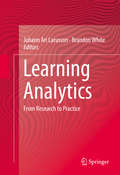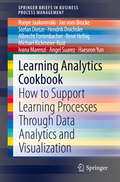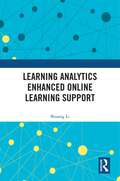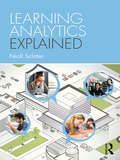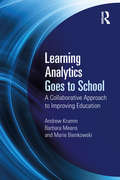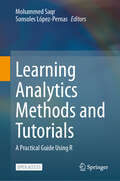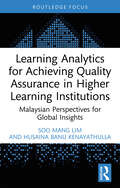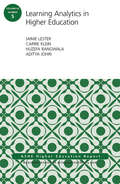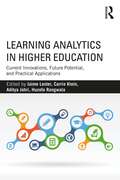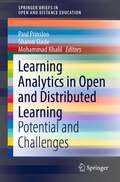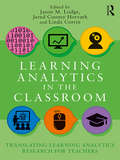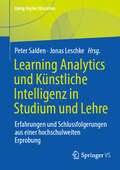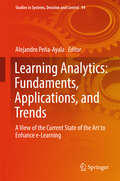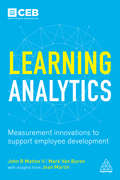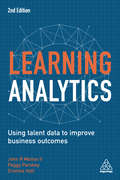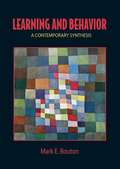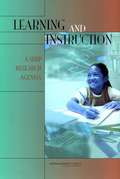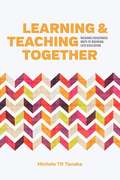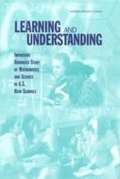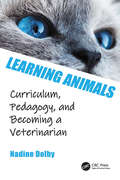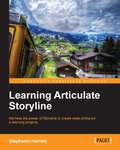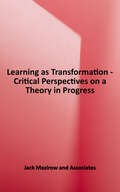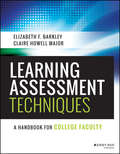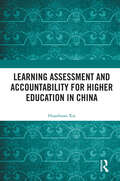- Table View
- List View
Learning Analytics
by Johann Ari Larusson Brandon WhiteIn education today, technology alone doesn't always lead to immediate success for students or institutions. In order to gauge the efficacy of educational technology, we need ways to measure the efficacy of educational practices in their own right. Through a better understanding of how learning takes place, we may work toward establishing best practices for students, educators, and institutions. These goals can be accomplished with learning analytics. Learning Analytics: From Research to Practice updates this emerging field with the latest in theories, findings, strategies, and tools from across education and technological disciplines. Guiding readers through preparation, design, and examples of implementation, this pioneering reference clarifies LA methods as not mere data collection but sophisticated, systems-based analysis with practical applicability inside the classroom and in the larger world. Case studies illustrate applications of LA throughout academic settings (e. g. , intervention, advisement, technology design), and their resulting impact on pedagogy and learning. The goal is to bring greater efficiency and deeper engagement to individual students, learning communities, and educators, as chapters show diverse uses of learning analytics to: Enhance student and faculty performance. Improve student understanding of course material. Assess and attend to the needs of struggling learners. Improve accuracy in grading. Allow instructors to assess and develop their own strengths. Encourage more efficient use of resources at the institutional level. Researchers and practitioners in educational technology, IT, and the learning sciences will hail the information in Learning Analytics: From Research to Practice as a springboard to new levels of student, instructor, and institutional success.
Learning Analytics Cookbook: How to Support Learning Processes Through Data Analytics and Visualization (SpringerBriefs in Business Process Management)
by Hendrik Drachsler Michael Kickmeier-Rust Stefan Dietze Ivana Marenzi Jan vom Brocke Roope Jaakonmäki Albrecht Fortenbacher René Helbig Angel Suarez Haeseon YunThis book offers an introduction and hands-on examples that demonstrate how Learning Analytics (LA) can be used to enhance digital learning, teaching and training at various levels. While the majority of existing literature on the subject focuses on its application at large corporations, this book develops and showcases approaches that bring LA closer to smaller organizations, and to educational institutions that lack sufficient resources to implement a full-fledged LA infrastructure. In closing, the book introduces a set of software tools for data analytics and visualization, and explains how they can be employed in several LA scenarios.
Learning Analytics Enhanced Online Learning Support
by Shuang LiOffering the latest developments in online education in the era of big data, this book explores theories, technologies, and practices in the field of data-driven online learning support services using learning analytics. This book is divided into five chapters. Chapter 1 reflects and reconstructs the connotation of learning support against the backdrop of education reform, the rise of learning analytics, and the upgrading of the demand for learning services in the new era. Chapter 2 presents a P-K-DSE-E model of online learner characteristics and discusses measurement and data representation methods for learner characteristics based on it. Chapters 3–5 focus on the three types of learning support that are closely related to learning performance and satisfaction, including the promotion of social learning, electronic learning assessment based on the learning process, and personalized tutoring and support. This book innovatively develops the concept, theory, and practical methods of student support services in distance education traditional practices in the new era and provides valuable exploration of data-driven personalized learning service methods and technologies in the era of artificial intelligence through rich examples. This book will be essential reading for students and scholars of distance and online education, educational technology, and audiovisual education.
Learning Analytics Explained
by Niall SclaterLearning Analytics Explained draws extensively from case studies and interviews with experts in order to discuss emerging applications of the new field of learning analytics. Educational institutions increasingly collect data on students and their learning experiences, a practice that helps enhance courses, identify learners who require support, and provide a more personalized learning experience. There is, however, a corresponding need for guidance on how to carry out institutional projects, intervene effectively with students, and assess legal and ethical issues. This book provides that guidance while also covering the evolving technical architectures, standards, and products within the field.
Learning Analytics Goes to School: A Collaborative Approach to Improving Education
by Andrew Krumm Barbara Means Marie BienkowskiLearning Analytics Goes to School presents a framework for engaging in education research and improving education practice through the use of newly available data sources and analytical approaches. The application of data-intensive research techniques to understanding and improving learning environments has been growing at a rapid pace. In this book, three leading researchers convey lessons from their own experiences—and the current state of the art in educational data mining and learning analytics more generally—by providing an explicit set of tools and processes for engaging in collaborative data-intensive improvement.
Learning Analytics Methods and Tutorials: A Practical Guide Using R
by Sonsoles López-Pernas Mohammed SaqrThis open access comprehensive methodological book offers a much-needed answer to the lack of resources and methodological guidance in learning analytics, which has been a problem ever since the field started. The book covers all important quantitative topics in education at large as well as the latest in learning analytics and education data mining. The book also goes deeper into advanced methods that are at the forefront of novel methodological innovations. Authors of the book include world-renowned learning analytics researchers, R package developers, and methodological experts from diverse fields offering an unprecedented interdisciplinary reference on novel topics that is hard to find elsewhere.The book starts with the basics of R as a programming language, the basics of data cleaning, data manipulation, statistics, and analytics. In doing so, the book is suitable for newcomers as they can find an easy entry to the field, as well as being comprehensive of all the major methodologies. For every method, the corresponding chapter starts with the basics, explains the main concepts, and reviews examples from the literature. Every chapter has a detailed explanation of the essential techniques and basic functions combined with code and a full tutorial of the analysis with open-access real-life data. A total of 22 chapters are included in the book covering a wide range of methods such as predictive learning analytics, network analysis, temporal networks, epistemic networks, sequence analysis, process mining, factor analysis, structural topic modeling, clustering, longitudinal analysis, and Markov models. What is really unique about the book is that researchers can perform the most advanced analysis with the included code using the step-by-step tutorial and the included data without the need for any extra resources.This is an open access book.
Learning Analytics for Achieving Quality Assurance in Higher Learning Institutions: Malaysian Perspectives for Global Insights (Routledge Research in Higher Education)
by Soo Mang Lim Husaina Banu KenayathullaThis book explores Learning Analytics (LA) programmes and practices in Malaysia as well as looking at the underlying forces, dilemmas and policy challenges for quality assurance in higher education institutions (HEIs). This chapters provide a comprehensive discussion of trends in academic quality assurance in higher education. It articulates a combination of theoretical issues and empirical analysis and offers a comprehensive guide to stakeholders in Management and Faculty on LA implementation in HEIs where the model in this book can be used to pave the way for a successful LA initiative. Learning Analytics is an emerging multidisciplinary technological practice with the ultimate goal of producing effective learning to improve students’ achievement in the tertiary level. The Learning Analytics model of Quality Assurance in this book is an essential guide for any faculty or manager in higher education, or researchers in higher education and learning analytics.
Learning Analytics in Higher Education: ASHE Higher Education Report (J-B ASHE Higher Education Report Series (AEHE))
by Jaime Lester Aditya Johri Huzefa Rangwala Carrie KleinLearning analytics (or educational big data) tools are increasingly being deployed on campuses to improve student performance, retention and completion, especially when those metrics are tied to funding. Providing personalized, real-time, actionable feedback through mining and analysis of large data sets, learning analytics can illuminate trends and predict future outcomes. While promising, there is limited and mixed empirical evidence related to its efficacy to improve student retention and completion. Further, learning analytics tools are used by a variety of people on campus, and as such, its use in practice may not align with institutional intent. This monograph delves into the research, literature, and issues associated with learning analytics implementation, adoption, and use by individuals within higher education institutions. With it, readers will gain a greater understanding of the potential and challenges related to implementing, adopting, and integrating these systems on their campuses and within their classrooms and advising sessions. This is the fifth issue of the 43rd volume of the Jossey-Bass series ASHE Higher Education Report. Each monograph is the definitive analysis of a tough higher education issue, based on thorough research of pertinent literature and institutional experiences. Topics are identified by a national survey. Noted practitioners and scholars are then commissioned to write the reports, with experts providing critical reviews of each manuscript before publication.
Learning Analytics in Higher Education: Current Innovations, Future Potential, and Practical Applications
by Jaime Lester Aditya Johri Huzefa Rangwala Carrie KleinLearning Analytics in Higher Education provides a foundational understanding of how learning analytics is defined, what barriers and opportunities exist, and how it can be used to improve practice, including strategic planning, course development, teaching pedagogy, and student assessment. Well-known contributors provide empirical, theoretical, and practical perspectives on the current use and future potential of learning analytics for student learning and data-driven decision-making, ways to effectively evaluate and research learning analytics, integration of learning analytics into practice, organizational barriers and opportunities for harnessing Big Data to create and support use of these tools, and ethical considerations related to privacy and consent. Designed to give readers a practical and theoretical foundation in learning analytics and how data can support student success in higher education, this book is a valuable resource for scholars and administrators.
Learning Analytics in Open and Distributed Learning: Potential and Challenges (SpringerBriefs in Education)
by Paul Prinsloo Sharon Slade Mohammad KhalilThis book explores and further expands on the rich history of theoretical and empirical research in open and distributed learning, and addresses the impact of the “data revolution” and the emergence of learning analytics on this increasingly diverse form of educational delivery. Following an introductory chapter that maps the book’s conceptual rationale, the book discusses the potential, challenges and practices of learning analytics in various open and distributed contexts. A concluding chapter briefly summarises the chapters before providing a tentative future research agenda for learning analytics in open and distributed environments.
Learning Analytics in the Classroom: Translating Learning Analytics Research for Teachers
by Jared Cooney Horvath Jason M. Lodge Linda CorrinLearning Analytics in the Classroom presents a coherent framework for the effective translation of learning analytics research for educational practice to its practical application in different education domains. Highlighting the real potential of learning analytics as a way to better understand and enhance student learning and with each chapter including specific discussion about what the research means in the classroom, this book provides educators and researchers alike with the tools and frameworks to effectively make sense of and use data and analytics in their everyday practice. This volume is split into five sections, all of which relate to the key themes in understanding learning analytics through the lens of the classroom: broad theoretical perspectives understanding learning through analytics the relationship between learning design and learning analytics analytics in the classroom and the impact it can and will have on education implementing analytics and the challenges involved. Bridging the gap between research, theory and practice, Learning Analytics in the Classroom is both a practical tool and an instructive guide for educators, and a valuable addition to researchers' bookshelves. A team of world-leading researchers and expert editors have compiled a state-of-the-art compendium on this fascinating subject and this will be a critical resource for the evolution of this field into the future.
Learning Analytics und Künstliche Intelligenz in Studium und Lehre: Erfahrungen und Schlussfolgerungen aus einer hochschulweiten Erprobung (Doing Higher Education)
by Peter Salden Jonas LeschkeIn dem Sammelband werden die Ergebnisse aus dem Projekt „KI:edu.nrw - Didaktik, Ethik und Technik von Learning Analytics und KI in der Hochschulbildung“ im Zeitraum 2020-2023 vorgestellt. Ziel des Projekts war es, sowohl an der im Schwerpunkt geförderten Ruhr-Universität Bochum als auch an der partnerschaftlich verbundenen RWTH Aachen exemplarisch zu erarbeiten, wie Regeln, Konzepte, Prozesse und Technik für den Einsatz von Learning Analytics und KI in Studium und Lehre ausgestaltet werden können. Die Besonderheit: Alle lehrbezogenen Akteurinnen und Akteure wurden in einem umfassenden Ansatz einbezogen, um zu verstehen, wie Hochschulen sich als Gesamtorganisationen auf die kommenden Herausforderungen in diesem Bereich einstellen müssen. Der Band zeigt damit Wege in eine zukünftige Hochschulwelt, die nicht mehr in allzu weiter Ferne liegt.
Learning Analytics: Fundaments, Applications, and Trends
by Alejandro Peña-AyalaThis book provides a conceptual and empirical perspective on learning analytics, its goal being to disseminate the core concepts, research, and outcomes of this emergent field. Divided into nine chapters, it offers reviews oriented on selected topics, recent advances, and innovative applications. It presents the broad learning analytics landscape and in-depth studies on higher education, adaptive assessment, teaching and learning. In addition, it discusses valuable approaches to coping with personalization and huge data, as well as conceptual topics and specialized applications that have shaped the current state of the art. By identifying fundamentals, highlighting applications, and pointing out current trends, the book offers an essential overview of learning analytics to enhance learning achievement in diverse educational settings. As such, it represents a valuable resource for researchers, practitioners, and students interested in updating their knowledge and finding inspirations for their future work.
Learning Analytics: Measurement Innovations to Support Employee Development
by Jean Martin Mark Van Buren John MattoxFaced with organizations that are more dispersed, a workforce that is more diverse and the pressure to reduce costs, CEOs and CFOs are increasingly asking what the return on investment is from training and development programmes. Learning Analytics provides a framework for understanding how to work with learning analytics at an advanced level. It focuses on the questions that training evaluation is intended to answer: is training effective and how can it be improved? It discusses the field of learning analytics, outlining how and why analytics can be useful, and takes the reader through examples of approaches to answering these questions and looks at the valuable role that technology has to play. Even where technological solutions are employed, the HR or learning and development practitioner needs to understand what questions they should be asking of their data to ensure alignment between training and business needs.Learning Analytics enables both senior L&D and HR professionals as well as CEOs and CFOs to see the transformational power that effective analytics has for building a learning organization, and the impacts that this has on performance, talent management, and competitive advantage. It helps learning and development professionals to make the business case for their activities, demonstrating what is truly adding value and where budgets should be spent, and to deliver a credible service to their business by providing metrics based on which sound business decisions can be made.
Learning Analytics: Using Talent Data to Improve Business Outcomes
by Cristina Hall John R Mattox II Peggy ParskeyEffective evaluation and measurement of learning and development initiatives is critical to maximise the impact of training, identify gaps for improvement and ensure that efforts are aligned to the business' needs. Learning Analytics outlines how analytical approaches can respond to these challenges, the types and benefits of technological solutions and how to ask the right questions of organizational data in order to build a learning organization that boosts performance and competitive advantage.Drawing upon case studies from organizations who have applied such approaches such as The Gap, Hilton Worldwide University and Seagate Technology, Learning Analytics will enable those involved in learning and development to make the business case for their activities and deliver an evidence-based service to their organizations. Alongside updated chapters on learning technology tools and moving beyond learning analytics to talent management analytics, this second edition also features new content on measuring informal learning, increasing data literacy, and framing L&D's contributions through a portfolio evaluation approach.
Learning And Behavior: A Contemporary Synthesis
by Mark E. BoutonProviding a strong background in modern learning and behavior theory, this book reflects the importance of the study of animal learning in psychology. Topics covered include learning and adaptation, modern conditioning theories, memory retrieval, instrumental learning, avoidance learning and learned helplessness.
Learning And Instruction: A Serp Research Agenda
by Panel On Learning InstructionThe Strategic Education Research Partnership (SERP) is a bold, ambitious plan that proposes a revolutionary program of education research and development. Its purpose is to construct a powerful knowledge base, derived from both research and practice, that will support the efforts of teachers, school administrators, colleges of education, and policy officials—with the ultimate goal of significantly improving student learning. The proposals in this book have the potential to substantially improve the knowledge base that supports teaching and learning by pursuing answers to questions at the core of teaching practices. It calls for the linking of research and development, including instructional programs, assessment tools, teacher education programs, and materials. Best of all, the book provides a solid framework for a program of research and development that will be genuinely useful to classroom teachers.
Learning And Teaching
by William DharmarajThis book is about of every stage in our life is being moulded to bring modifications in our knowledge and behaviour. Thus changes in our behaviour are brought by the experiences that we gained through the interaction with the environment and its people.
Learning And Teaching Together: Weaving Indigenous Ways Of Knowing Into Education
by Michele Td TanakaTeachers unfamiliar with Aboriginal approaches to learning are seeking ways to respectfully weave Aboriginal content into their lessons. This book introduces an indigenist approach to education. It recounts how pre-service teachers immersed in a crosscultural course in British Columbia began to practise Indigenous ways of knowing. Working alongside Indigenous wisdom keepers, they transformed earth fibres into a mural and, in the process, their own ideas about learning and teaching. By revealing how these students worked to integrate Indigenous ways of knowing into their practice, this book opens a path for teachers to nurture indigenist crosscultural understanding in their classrooms.
Learning And Understanding: Improving Advanced Study Of Mathematics And Science In U.s. High Schools
by Committee on Programs for Advanced Study of Mathematics Science in American High SchoolsThis book takes a fresh look at programs for advanced studies for high school students in the United States, with a particular focus on the Advanced Placement and the International Baccalaureate programs, and asks how advanced studies can be significantly improved in general. It also examines two of the core issues surrounding these programs: they can have a profound impact on other components of the education system and participation in the programs has become key to admission at selective institutions of higher education.By looking at what could enhance the quality of high school advanced study programs as well as what precedes and comes after these programs, this report provides teachers, parents, curriculum developers, administrators, college science and mathematics faculty, and the educational research community with a detailed assessment that can be used to guide change within advanced study programs.
Learning Animals: Curriculum, Pedagogy and Becoming a Veterinarian
by Nadine DolbyWe are surrounded by thousands of animals, alive and dead. They are an intimate and ever-present part of our human lives. As a society, we privilege veterinarians as experts on these animals: they are our educators and teachers in what they say, what they do, and the decisions that they make. Yet, within the field of education, there is little research on the curriculum, pedagogy, and experiences of veterinary school and students. What do veterinarians learn in veterinary school? How do their experiences during those four years shape their perceptions of animals? How do the structures, curriculum, and pedagogy of veterinary college create and influence these experiences? Learning Animals opens up this conversation through an exploration of the complicated, fascinating and often painful stories of a cohort of veterinary students as they make their four-year journey from matriculation through graduation. The book examines how the experiences of veterinary students shape how humans relate to animals, from public policy and decision-making about the environment and animals slaughtered for food, to the most personal decisions about euthanizing companion animals. The first full-length, critical, qualitative study of the perspectives of our primary teachers about animals, this will be a thought-provoking read for those in the fields of both educational research and veterinary education.
Learning Articulate Storyline
by Stephanie HarnettThis book provides one-on-one tutoring to help you quickly get up to speed with the basics while also learning how to best apply Storyline features in the context of the work you do.If you're an e-learning developer, writer, designer, subject matter expert, or all or any one of these, this book is for you. This book is not just for novices, but also for seasoned developers, transitioning from PowerPoint and Articulate Studio '09, and for those who are already working with Storyline.
Learning As Transformation: Critical Perspectives on a Theory in Progress, 1st Edition
by Jack MezirowProvocative and illuminating, this book is a must-read for adult educators seeking to understand and facilitate transformational learning. It showcases a stellar group of authors who not only engage each other and the reader in constructive discourse, but who also model the heart of the transformational learning process." --Sharan B. Merriam, Department of Adult Education, University of Georgia This volume continues the landmark work begun by Jack Mezirow over twenty years ago--revealing the impact of transformative learning on the theory and practice of adult education. Top scholars and practitioners review the core principles of transformation theory, analyze the process of transformative learning, describe different types of learning and learners, suggest key conditions for socially responsible learning, explore group and organizational learning, and present revelations from the latest research. They also share real-world examples drawn from their own experiences and assess the evolution of transformative learning in practice and philosophy. Learning as Transformation presents an intimate portrait of a powerful learning concept and invites educators, researchers, and scholars to consider the implications of transformative learning in their professional work.
Learning Assessment Techniques
by Elizabeth F. Barkley Claire Howell Major50 Techniques for Engaging Students and Assessing Learning in College Courses Do you want to: Know what and how well your students are learning? Promote active learning in ways that readily integrate assessment? Gather information that can help make grading more systematic and streamlined? Efficiently collect solid learning outcomes data for institutional assessment? Provide evidence of your teaching effectiveness for promotion and tenure review? Learning Assessment Techniques provides 50 easy-to-implement active learning techniques that gauge student learning across academic disciplines and learning environments. Using Fink's Taxonomy of Significant Learning as its organizational framework, it embeds assessment within active learning activities. Each technique features: purpose and use, key learning goals, step-by-step implementation, online adaptation, analysis and reporting, concrete examples in both on-site and online environments, and key references--all in an easy-to-follow format. The book includes an all-new Learning Goals Inventory, as well as more than 35 customizable assessment rubrics, to help teachers determine significant learning goals and appropriate techniques. This book also provides access to a downloadable worksheet to guide teachers through the seven steps of the Learning Assessment Techniques planning and implementation cycle. College teachers today are under increased pressure to teach effectively and provide evidence of what, and how well, students are learning. An invaluable asset for college teachers of any subject, Learning Assessment Techniques provides a practical framework for seamlessly integrating teaching, learning, and assessment.
Learning Assessment and Accountability for Higher Education in China
by Huanhuan XiaThe book explores how to use student learning outcomes assessment data to improve teaching and learning in Chinese higher education.The author comprehensively examines the assessment of learning outcomes within the context of both internal and external quality assurance schemes in China. She argues that such assessment must be applied within a defined policy framework, organizational structure, and operational procedures. The author highlights the importance of student learning outcomes assessment in Chinese higher education, its current state, and ways to use assessment data for accountability and the improvement of students’ learning quality. The book makes an original contribution to higher education by exploring whether and how such assessments influence the challenging, resource-intensive, and complex task of improving and sustaining education quality.The book will appeal to scholars and postgraduate students of higher education, education assessment and evaluation, and critical thinking.
